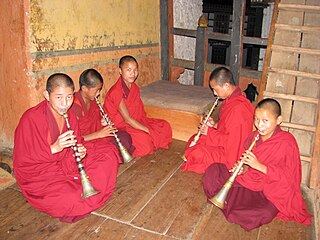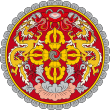Telecommunications in Peru include radio and television, fixed and mobile telephones, and the Internet.
Telecommunications in Bhutan includes telephones, radio, television, and the Internet.

The music of Bhutan is an integral part of its culture and plays a leading role in transmitting social values. Traditional Bhutanese music includes a spectrum of subgenres, ranging from folk to religious song and music. Some genres of traditional Bhutanese music intertwine vocals, instrumentation, and theatre and dance, while others are mainly vocal or instrumental. The much older traditional genres are distinguished from modern popular music such as rigsar.

The Royal Bhutan Army, is a branch of the armed forces of the Kingdom of Bhutan responsible for maintaining the country's territorial integrity and sovereignty against security threats. The King of Bhutan is the Supreme Commander in Chief of the RBA. The Chief Operations Officer is Goonglon Gongma Batoo Tshering.
Kuensel is the national newspaper of the Kingdom of Bhutan. It was the only local newspaper available in Bhutan until 2006 when two more newspapers were launched. The government of Bhutan owns 51% of Kuensel while 49% is held by the public.

The Bhutan Broadcasting Service is the state-owned radio and television service in Bhutan. A public service corporation, it is fully funded by the state and it is the only service to offer both radio and television to the kingdom, and is the only television service to broadcast from inside the Bhutanese border. The use of telecommunications is currently governed through the Information, Communications and Media Act of 2006.

Bhutan, officially the Kingdom of Bhutan, is a landlocked country in South Asia. Located in the Eastern Himalayas, it is bordered by the Tibet Autonomous Region of China in the north, the Sikkim state of India and the Chumbi Valley of Tibet in the west, the Arunachal Pradesh state of India in the east, and the Indian states of Assam and West Bengal in the south. Bhutan is geopolitically in South Asia and is the region's second least populous nation after the Maldives. Thimphu is its capital and largest city, while Phuntsholing is its financial center.
The media of Turkey includes a wide variety of domestic and foreign periodicals expressing disparate views, and domestic newspapers are extremely competitive. However, media ownership is concentrated in the hands of a few large private media groups which are typically part of wider conglomerates controlled by wealthy individuals, which limits the views that are presented. In addition, the companies are willing to use their influence to support their owners' wider business interests, including by trying to maintain friendly relations with the government. The media exert a strong influence on public opinion. Censorship in Turkey is also an issue, and in the 2000s Turkey has seen many journalists arrested and writers prosecuted. On Reporters Without Borders' Press Freedom Index it has fallen from being ranked around 100 in 2005 to around 150 in 2013.
Censorship in Bhutan refers to the way in which the Government of Bhutan controls information within its borders. There are no laws that either guarantee citizens' right to information or explicitly structure a censorship scheme. However, censorship in Bhutan is still conducted by restrictions on the ownership of media outlets, licensing of journalists, and the blocking of websites.
The Bhutan Observer was Bhutan's first private bilingual newspaper. It was launched as a private limited company by parent company Bhutan Media Services (BMS), and began publishing on June 2, 2006, in Thimphu. Its Dzongkha edition is called Druk Nelug, and the newspaper maintains an online service in English.

Lesbian, gay, bisexual and transgender (LGBT) people in Bhutan may face legal challenges not faced by non-LGBT people. Homosexuality is illegal in Bhutan. The Penal Code states that same-sex sexual acts are punishable by a prison sentence of between one month to less than one year. However, the law is not enforced and is currently being reviewed by the Parliament.
The media of Armenia refers to mass media outlets based in Armenia. Television, magazines, and newspapers are all operated by both state-owned and for-profit corporations which depend on advertising, subscription, and other sales-related revenues. As of 2018, there were few indicators of a healthy and independent media.
The media of North Macedonia refers to mass media outlets based in North Macedonia. Television, magazines, and newspapers are all operated by both state-owned and for-profit corporations which depend on advertising, subscription, and other sales-related revenues. The Constitution of North Macedonia guarantees freedom of the press and of expression, yet they are not upheld impartially by the authorities. As a country in transition, North Macedonia's media system is under transformation.
Algeria has more than 45 independent Arabic language and French language publications as well as 4 government-owned newspapers, but the government controls most printing presses and advertising. The Algerian newspapers with the largest circulations are Echourouk (1,800,000), Ennahar (1,600,000), El Khabar (1,000,000) and Quotidien d'Oran (700,000); all four are employee-owned. The government also owns all radio and television outlets, which provide pro-government programming. In 2004 and 2005, the government increased the access of Berber language and culture to both print and broadcast media.
The media of Gabon is primarily monitored by the Gabon government. Although the main newspapers are associated with the government, there are private broadcasters, and private weekly newspapers that are mostly controlled by opposition parties.

Bathpalathang Airport is a domestic Bhutanese airport in Jakar (Bjakar), Bumthang District. One of only four airports in the country, it opened on 17 December 2011 with flights to Paro. The airport suspended operations in July 2012 due to runway damage, but it has since reopened to limited service.
AumDorji Choden is a Bhutanese politician. She was appointed minister of Bhutan's Works and Human Settlement Ministry in 2013, making her the first woman to serve as a minister in Bhutan.

The cinema of Bhutan is a small but emerging industry, having started in the mid-1990s. It has since been supported by government officials and different businesses.

Lotay Tshering is a Bhutanese politician and doctor who is the current Prime Minister of Bhutan, in office since 7 November 2018. He has also been the president of Druk Nyamrup Tshogpa since 14 May 2018.









